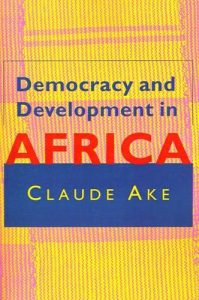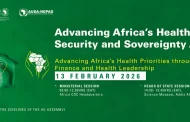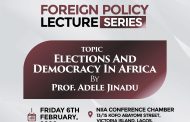Ambassador Usman Sarki concludes his trilogy on this subject:
There is no shortage of normative and institutional frameworks against coup d’etat and unconstitutional changes of governments in Africa. Both the Organisation of African Unity (OAU) and the African Union (AU) were founded on the principles of sovereign equality of all African nations, and the supremacy of the rule of law in their internal political arrangements. The AU’s Constitutive Act lays great emphasis on democratic governance and rule of law, and repudiates the forceful alteration of political arrangements in member-states either through coup d’etats or revolutionary insurrections as evidenced by its Articles three and four for instance.
 The Act also sets the common denominators and standards for African countries to establish credible democratic practices and imbibe the general principles of good governance and rule of law as the basis of civil society and inclusive political processes. Regional arrangements aimed at ensuring the safeguarding of democratically elected governments in the continent have therefore, been in place as far back as 1990. The “Declaration on the Political and Socio-economic Situation in Africa and the Fundamental Changes Taking Place in the World and the Implications for Africa”, was adopted at the twenty-sixth ordinary session of the OAU Heads of State and Government in Addis Ababa, in July 1990. It coincided with the end of the Cold War and the perceptible dismantling of the Apartheid system in South Africa.
The Act also sets the common denominators and standards for African countries to establish credible democratic practices and imbibe the general principles of good governance and rule of law as the basis of civil society and inclusive political processes. Regional arrangements aimed at ensuring the safeguarding of democratically elected governments in the continent have therefore, been in place as far back as 1990. The “Declaration on the Political and Socio-economic Situation in Africa and the Fundamental Changes Taking Place in the World and the Implications for Africa”, was adopted at the twenty-sixth ordinary session of the OAU Heads of State and Government in Addis Ababa, in July 1990. It coincided with the end of the Cold War and the perceptible dismantling of the Apartheid system in South Africa.
It addressed the underlying causes of instability in Africa, noting the prevalence of conflicts, poor economic performance, foreign debts and food insecurity as constituting serious adversity to the continent, while underlining the need for popular participation of African peoples in the processes of government and development. Paragraphs ten and eleven of the Declaration in particular, stress the importance of consolidating democracy in Africa, with active participation of youths and women in all processes in government in their countries. They also underlined the importance of peace and security towards the deepening of democracy in the continent.
The “African Charter for Popular Participation in Development” adopted in Addis Ababa also in July 1990, was a reaffirmation of the need to provide African people with the opportunities to actualise themselves in the political and development arenas, and realise the mission of inclusiveness in all member-states. Likewise the “Cairo Agenda for Action” on Africa’s economic and social development of 1995, provided the means for strengthening the normative frameworks of the OAU towards establishing the conditions that are necessary for the deepening of democracy, human rights and rule of law in the continent. The “Agenda” in particular emphasised the need for free and fair elections, freedom of the press, of association and conscience which form the bedrock of democracy.
Of particular relevance to our topic on unconstitutional changes of governments was the OAU’s “Declaration on Unconstitutional Changes of Governments” (Algiers Declaration of 1990). This anticipates the phenomenon of forceful changes in member-states’ political and governance systems, and creates mechanisms for dealing with such unwholesome actions. The OAU also adopted the “Declaration on the Framework for an OAU Response to Unconstitutional Changes of Government” (Lomé Declaration of July 2000) in member-states in which they affirmed their belief in democratic governance and repudiated all forms of unconstitutional changes of government in the continent. Both the Lome and Algiers Declarations contain clear guidelines towards averting undemocratic takeovers of power, and provide courses of action towards mitigating such misadventures.
The Organisation further established an additional framework in the form of the “Solemn Declaration on the Conference on Security, Stability, Development and Cooperation in Africa (CSSDCA) in 2000, which contains some bold pronouncements about the desirability for peace, security and stability in Africa, as prerequisites for good governance and vice versa. The CSSDCA provided further impetus to the 1997 Harare Summit declaration on unconstitutional changes of government, that subsequently translated into the Algiers Declaration of 1999. The CSSDCA is particularly important in its recognition of the four major factors that could advance the cause of democracy in Africa known as the “Calabashes” namely security, stability, development and cooperation, with their underpinning general principles of good governance, respect for human and peoples’ rights and rule of law.
In 2002 the OAU transited to the AU, with member-states agreeing to the endorsement of the “Declaration on Principles Governing Democratic Elections in Africa” which contained general principles on the conduct of democratic elections in Africa, with additional emphasis on the responsibilities of member-states as well as the rights and obligations of citizens towards establishing enduring democratic cultures across the continent. The African Charter on Human and Peoples’ Rights adopted in Nairobi in 1987 of course predated all the above instruments, and gave birth to institutional frameworks especially the African Court of Human and Peoples’ Rights to pass judgment where applicable on the rights that Africans are entitled to universally in their continent that includes the right to freely choose their systems of government.
 The overarching normative framework on elections and democratic governance in Africa is the African Charter on Democracy, Elections and Governance (ACDEG) which was adopted in 2007 by the African Union in Addis Ababa five years after the transformation of the OAU into the AU. This landmark framework guides the approach to democratic governance in the continent, while the AU Constitutive Act itself serves as the bulwark against forceful changes of government in any of its member-states. The ACDEG has been useful in ensuring that African countries remain on course in democratic governance and in averting a relapse into unconstitutional practices like forceful changes of government. Article 2 of the Charter in particular remains an important safeguard against instability and interruptions to peaceful transition of power in democratic settings under the rule of law in Africa.
The overarching normative framework on elections and democratic governance in Africa is the African Charter on Democracy, Elections and Governance (ACDEG) which was adopted in 2007 by the African Union in Addis Ababa five years after the transformation of the OAU into the AU. This landmark framework guides the approach to democratic governance in the continent, while the AU Constitutive Act itself serves as the bulwark against forceful changes of government in any of its member-states. The ACDEG has been useful in ensuring that African countries remain on course in democratic governance and in averting a relapse into unconstitutional practices like forceful changes of government. Article 2 of the Charter in particular remains an important safeguard against instability and interruptions to peaceful transition of power in democratic settings under the rule of law in Africa.
The Article is especially intended to promote adherence to the universal ethos and values of democracy and respect for human rights. It is predicated particularly on the promotion of rule of law premised upon the ascendency of constitutional order over any other factor or interests. Beyond such instruments, the AU went on to establish sanctions regimes against erring adventurers who might deem it expedient and profitable to flout these principles. The body’s Peace and Security Council (AUPSC) is empowered to recommend to the Assembly appropriate measures by way of interdiction and penalties for the breach of the continental frameworks on democratic governance.
This is in accordance with the provisions of Article seven (g) of the Protocol Relating to the Establishment of the Peace and Security Council of the African Union (2003) and Article thirty of the AU Constitutive Act. The Charter reiterates the fundamental principles and values that have been established by the OAU/AU over several years of deliberations, and lays out the essential attributes of democratic governance in Africa. Chapters two and three outline the basic objectives and purposes of the Charter, which include adherence to the universal principles and values of democracy and respect for human rights.
The Chapter also outlines the “dos” and “don’ts” of governance, such as respect for rule of law and promoting good governance, and eschewing corruption and arbitrary changes of government in member-states. Likewise Chapters four and five address the general attributes of democracy, human rights and rule of law, as well as the basic prerequisites needed for the establishment of democratic cultures across Africa. Crucially, Chapter eight outlines the sanctions that should be imposed against erring regimes in situations of forceful or unconstitutional changes of government in Africa.
In essence therefore, Africa has a well established tradition of democratic governance based on the principles and aspirations that have been enunciated over several decades in the apex regional organisations as early as 1987. However, establishing general principles and observing them in the breach rather than in practice is a totally different and unforeseen outcome that has to do with the set-up and conditions obtaining in the individual member-states of the African Union. Any multilateral organisation composed of independent and sovereign states can only function in accordance with the whims and caprices of its individual constituents.
The fact that there is a relapse into unconstitutional changes of government in some African countries does not in itself portend the incapacitation or the deficiency of the African Union. It simply exposes the inherent instability in many African states whose internal contradictions and grave organisational deficiencies have been left unaddressed over decades of misrule and corruption. There is however the need for the insistence and probably a collective determination by the members of the African Union to put a stop to anachronistic military adventurism now rearing its head in Africa.
The AU Peace and Security Council should now perhaps be geared fundamentally towards addressing expeditiously and decisively matters related to instability caused by election malpractices and bad governance in Africa, while not losing sight of far more serious incidents like terrorism, conflicts and other threats to peace and security in the continent. Countries like Nigeria, South Africa, Senegal, Ghana, Algeria, Kenya, Angola, Egypt, Uganda, Tanzania, Zambia and others would need to be more willing and forthcoming in taking the lead to entrench conditions for irreversible attainment of democratic governance in Africa.
That would of course be a tall order, considering that in some of these countries the foundations of democratic governance are still shaky and rather nebulous, with constitutional amendments taking place to elongate tenures of leaders which in effect vitiates the ethos and principles of the OAU/AU normative frameworks.




























